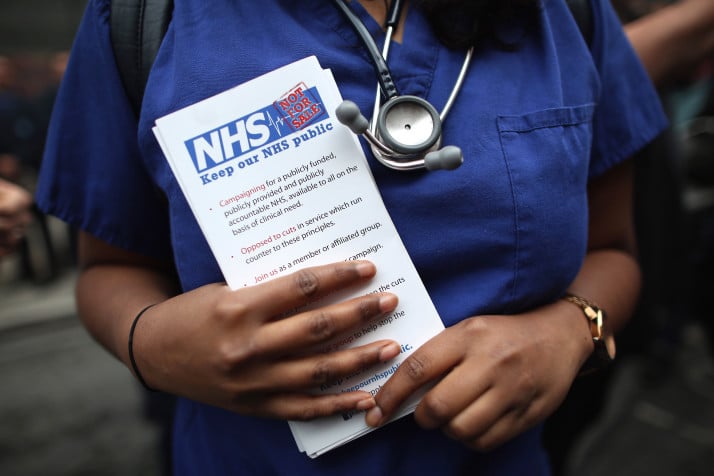The UK National Health Services (NHS) is considered one of the most efficient and innovative healthcare systems in the world. Of late, the NHS has not only grown exponentially in terms of workforce and service scope but also has adopted a range of new tools and processes to ensure they provide quality patient care.
Among the technologies that many NHS staff, including those delivering vital patient care, use nowadays for daily healthcare delivery, are mobile communication tools, specifically consumer messaging apps such as Facebook Messenger, WhatsApp, and iMessage. According to a recent report from CommonTime, more than half a million NHS staff use consumer messaging apps to communicate with colleagues at work.
This figure is in line with the separate report from British Medical Journal, which also indicates that 97% of doctors routinely send sensitive patient information on instant messaging apps – this, despite the fact that 68% are concerned about the risks of using consumer-grade messaging apps to data security and patient confidentiality.
Why Are Healthcare Professionals Still Using Consumer Messaging Apps?
One of the reasons why consumer messaging apps have become so rampant among NHS trusts in the UK is the fact that most of these facilities have no official policies to discourage the use of such channels in their workplace, let alone have an enterprise platform that will allow them archive WhatsApp messages, record voice calls, as well as archive text messages that contain sensitive patient healthcare information.
In fact, early this year, every one of the 200 trusts across the UK failed a government-led cybersecurity assessment which determined if NHS have the necessary cybersecurity requirements that would prevent WannaCry attack – if ever such cyberattack of that scale would happen again. A recently released report also found that NHS lost or misplaced almost 10,000 patient records in 2017 and that 94% of NHS trusts are still using handwritten notes for documentation.
There is also evidence to suggest that instant messaging apps are being used by clinical staff and administrative support staff for mundane purposes such as shift handovers and schedule management. A key driving factor for such fractious usage of consumer messaging apps can be attributed to the fact that many NHS staff believe that those channels are vital to delivering quality healthcare. ‘
From the same report, staff most commonly reported using the following features; group messaging (67%), photo sharing (50%), voice or video calling (37%), document sharing (30%) and video sharing (28%).
Consumer messaging apps have become so ingrained in the fabric of NHS, that over 30% of staff believe patient care would suffer if healthcare professionals did not have access to WhatsApp, Facebook Messenger, and other consumer-grade messaging tools. Some 42% of staff also indicated that faster patient responsiveness was a key benefit that currently improves patient care, highlighting another potential risk if those channels were to be prohibited in their organization.
Furthermore, the continued security lapses and failure to establish clear cybersecurity standards and policies indicates that while the NHS is continuously innovating by integrating new communication technologies into its day-to-day healthcare delivery, it faces enhanced risks of being victim of cybersecurity attacks given the lax approach in providing more secure and reliable enterprise messaging app to the staff.
The Need For a Consumer-Friendly Enterprise-Grade Messaging Platform
These statistics only indicate that public healthcare organizations in the UK must up their workplace communication infrastructure not only to avoid cyber risks associated with using consumer-grade apps but also to continue providing quality service to their patients.
To address this issue, new Health and Social Health Secretary Matt Hancock has announced in his July 20 speech a £487m funding package for NHS technology. “I came from a tech background before I went into politics, and I love using modern technology myself,” Hancock said. “Not only do I have my own app for communicating with my constituents here in West Suffolk, but as you may have heard I use an app for my GP.” Hancock said.
While there are many NHS trusts that have already taken the initiative of providing their staff with better and more secure instant messaging tools, a significant number of organizations are yet to take action to address this issue.
With more stringent data protection regulation such as GDPR in place, having an enterprise-grade mobile messaging platform can enable UK healthcare organizations to continue to take advantage of using mobile messaging apps all without the risks of non-compliance and minimizing the risks for data breach and other cybersecurity threats.
With a secure enterprise messaging app like Telemessage, collaboration among healthcare staff would be enhanced, as it would allow clinical staff to easily share information and update each other on joint patients to provide a more holistic view of their condition, or to get a second opinion.
Healthcare institutions will have better records of these collaborations to call upon if needed, and can also ensure that the messaging app they purchase has the features needed to allow the best transferring of information, for example maintaining a certain quality when transferring scans, so details are not missed
The benefits of a compliant secure enterprise messaging system for the healthcare industry is boundless, and it is time the NHS steps up their standards and allow healthcare professionals to fully utilize their mobile devices as the primary communication tool for enhancing patient care.
Contact us today to learn more about our Secure Enterprise Messaging System, Mobile Archiver, and Mass Messaging platform.




